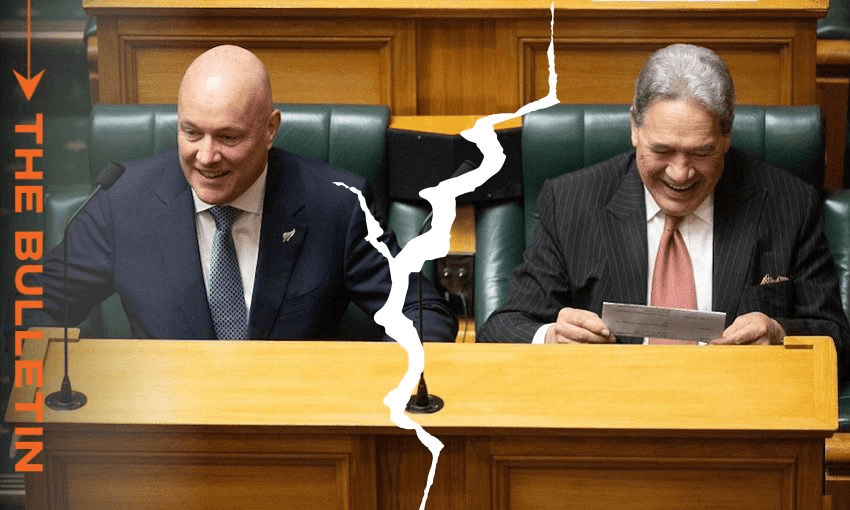As the US ramps up tariffs, the PM and his deputy are clashing – not just over strategy, but over who gets to define New Zealand’s foreign policy tone, writes Catherine McGregor in today’s extract from The Bulletin.
To receive The Bulletin in full each weekday, sign up here.
The fracture in foreign policy messaging
As global tensions rise over Donald Trump’s trade war, Christopher Luxon has been working the phones and polishing his statesman credentials, pitching New Zealand as a voice for free trade. On Thursday, Luxon declared that “free trade is worth fighting for” and that he’d spend the rest of the day calling around world leaders to rally support for strengthening the CTTPP free trade agreement, potentially via a link-up with the EU. His foreign minister was not impressed. Speaking on Sunday, Winston Peters described such fighting talk as “hysterical and short-sighted”, and warned against “react[ing] too quickly and too stridently” to unfolding events. Of Luxon, he said: “I hope he’ll get my message and call me next time.”
A question of consultation
At the core of the disagreement is the perception that Luxon went it alone. The PM insists the issue had been discussed in cabinet and that all ministers were on the same page, Stuff’s Glenn McConnell reports. However the Herald’s Thomas Coughlan (Premium paywalled) says Luxon’s “White Pages diplomacy” was concocted on the fly and his coalition partners are annoyed that they weren’t properly consulted.
For Pattrick Smellie in BusinessDesk (paywalled), Peters’ indignation is a bit rich. Luxon’s plan is “precisely the strategy currently being pursued around the clock by the trade negotiators and diplomats of his own Mfat. Peters must surely be aware of that. Yet he described Luxon’s actions as ‘premature’, suggesting NZ should keep its head down and wait for the dust to settle, implying that what is playing out in Washington DC is part of a cunning plan.
“This sounds all too much like an endorsement of the absurd notion that Trump is playing four-dimensional chess when he is clearly blundering about and destroying wealth, trust and coherence, while actively surrendering US global influence.”
The politics in the background
While the disagreement may look like a policy clash, the politics behind it are just as significant. Smellie says that Luxon’s free trade pitch was a rare moment of confident leadership after months of missteps. For Peters, on the other hand, the episode presented a chance to reassert himself as a senior partner in the coalition, especially with David Seymour about to take on the deputy prime ministership, writes Sam Sachdeva in Newsroom.
Peters may also be trying to put some distance between himself and the government ahead of a possible snap election, writes Richard Harman in Politik (paywalled). NZ First has apparently “begun preparing contingency plans for an election before the end of the year… worried that once Act leader David Seymour becomes deputy PM they can see an increased potential for the coalition to break up”.
Sticking our neck out
Behind the spat lies a thornier question: should New Zealand be drawing this much attention to itself at all? While most in parliament agree on the value of free, low-tariff trade, “believing in free trade is quite different from proclaiming that belief so loudly you provoke a war of words with the most powerful (and volatile) man in the world,” writes Coughlan. Luxon may win domestic points for speaking out, but his approach risks being interpreted as promoting an anti-Trump alliance. And that could be a very dangerous position for New Zealand to find itself in.


